
by Jacqueline Jenkins (Jordan) | Mar 4, 2015 | 2015, Jordan, Technology, Traditions, Uncategorized, World Motherhood
 Outside Amman, the capital city of my new home, life continues to unfold much as it has for centuries. Or so it seems at first glance.
Outside Amman, the capital city of my new home, life continues to unfold much as it has for centuries. Or so it seems at first glance.
Recently, during a trip to Wadi Rum and Petra, we met and dined with many local Bedouin people. For dinner, they invited us to share the meat of a sheep which had been freshly slaughtered for our visit. Our hosts had different histories and journeys that brought them around the fire pit, but they all shared a wonderful pride for their country, their renowned hospitality, and their treasured historical and geological landmarks.
Mubarak, a man about my age, with a weathered face and kind, soft eyes, talked to me for hours around the fire. He told me of his family’s history, the way he grew up moving from one part of the desert to another during different parts of the year, herding sheep and searching for firewood. He talked of the Bedouin people’s common ancestry and desire to keep traditions alive, and about his favorite sand dune in the whole desert–his eyes clouded over as he recalled memories of the spot and described how the sand is as fine as flour. Then, without even a second thought, he grabbed his mobile phone out of his flowing, white shirt and asked if I would like to Skype with his friends Robert and Dee in Mexico.
To me, two worlds collided.
I couldn’t help but fall back on my elbows and laugh.
My children, like yours, are growing up in an ever-changing world. Preserving unique cultures, traditions and practices is becoming more difficult as we connect digitally through Skype, Facebook, What’sApp and other technology.
I see technology as a great equalizer, an incredible tool for those in the developing world–but also as something to treated with great care if we are to preserve the traditional practices in the world.
What do you do with your children to preserve family or cultural traditions? Does technology help or hinder your efforts?
Photo credit to the author. This is an original post to World Moms Blog.

We are a few months into our new 'home of our heart' location in Amman, Jordan. Originally from Canada, I have been moving around the globe for more than twenty years as my husband works for UNICEF. While we were a carefree couple in Uganda, Lesotho and Bangladesh, Meghan joined our family in 2000, while we were living in Myanmar. She was joined in 2005, while we were posted in India by Charlie, her energetic younger brother! Since then we have lived in Mozambique and New York. I am an educator and have been incredibly fortunate to have found rewarding jobs in international schools wherever we have been posted. Most recently I was the Elementary School Principal at the United Nations International School in Manhattan. Since arriving in Jordan, I have been a stay at home Mum, exploring, photographing and learning about the incredible history of the region and the issues facing not only the Jordan population but the incredible number of Syrian refugees currently residing in the country. While I speak English and French, I have not yet started to learn Arabic; a big goal for our time here.
I write to record and process this incredible journey we are on as a family. Time passes so incredibly quickly and without a recording of events, it's hard to remember the small moments and wonderings from each posting. Being a mother in this transient lifestyle means being the key cheerleader for our family, it means setting up and taking down a house with six weeks notice, it means creating close friendships and then saying goodbye. All this, while telling yourself that the opportunities your children have make the goodbyes and new hellos worthwhile. Raising a child in this lifestyle has incredible challenges and rewards. The challenges include culture shock every single time, even when you feel the move will be an easy one. It means coaching yourself, in your dark moments to be present and supportive to your children, who have not chosen to move but are trusting you to show them the world and the meaningfulness of the lifestyle we have committed to as a UNICEF family. The upsides to this lifestyle are incredible; the ability to have our children interact and learn about cultures, languages, food, and religions firsthand, the development of tolerance and empathy through relationships with many types of different people and the travel, they have been to more places before the age of ten than some people do in a lifetime! My commitment to raising children who believe in peace and feel responsible for making a difference in creating a better world is at the core of everything I do.
More Posts
Follow Me:


by Mama B (Saudi Arabia) | Feb 25, 2015 | 2015, Government, Grief, Media, Saudi Arabia, Uncategorized, World Events, World Motherhood
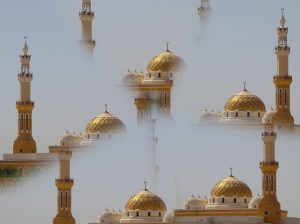 Early in the evening, we heard that he was not doing well. Then again, as is the way here, we had been hearing a great many things since the king had entered the hospital. Although Riyadh, the capital city of Saudi, has a population of four million, it still functions like a little neighborhood. Everyone has a ‘reliable source’ on the inside. As a rule, I do not believe anything until it is officially on the news–and even then, I take it with a grain of salt. Nonetheless, it was hardly a surprise when, at 2:00 AM, Saudi Arabian television announced the death of King Abdullah bin Abdulaziz Al-Saud at the age of 90. Even though I expected the news, it broke my heart.
Early in the evening, we heard that he was not doing well. Then again, as is the way here, we had been hearing a great many things since the king had entered the hospital. Although Riyadh, the capital city of Saudi, has a population of four million, it still functions like a little neighborhood. Everyone has a ‘reliable source’ on the inside. As a rule, I do not believe anything until it is officially on the news–and even then, I take it with a grain of salt. Nonetheless, it was hardly a surprise when, at 2:00 AM, Saudi Arabian television announced the death of King Abdullah bin Abdulaziz Al-Saud at the age of 90. Even though I expected the news, it broke my heart.
I watched the local Saudi channel for a while, then I switched, curious to see how the foreign press would frame the news. They appeared to be competing to see who could be the most negative about Saudi Arabia’s progress under King Abdullah’s reign. Although their own experts pointed to the king’s many accomplishments, the foreign networks seemed to delight in ignoring them and focusing on the dissidents. Reporter after reporter repeated that progress in Saudi was occurring at a ‘glacial rate.’
The western media used its standard to measure my country’s progress.
Maybe they assumed that their standard is the one all the world should aspire to? They ignored how different Saudi is in our priorities, life style, and even our wants and needs. They ignored how young a country we are, and they certainly did not measure how far we have come.
By the morning we had a new king. No bloodshed, no chaos, no ‘state of emergency’, no transitional government. We have come far under King Abdullah’s reign. Yes, Saudis do recognize our shortcomings, and, yes, we do want to–and will–improve. But we should, and will, recognize and celebrate our accomplishments along the way.
We must be doing something right, as we are the most stable country in the region. We are battling the Houthis in the south, ISIS in the north, and successfully fighting terrorism on our own soil, all while growing our universities and health care system. In the past decade, women have been elected to the Shura Council, which advises the king. Twenty-eight universities were built. Two hundred thousand students were given scholarships to universities overseas. Six medical cities were built, 11 specialist hospitals were built, and 32 general hospitals were built. Finally, as a woman in Saudi Arabia, I seen both an expansion of the opportunities I have in my own life, and in the paths that are being laid for my daughter’s future, which far exceed anything available to me when I was her age.
For days after King Abdullah’s death, I could not stop crying. I watched my country mourn on the streets around Saudi. It was as if we had lost our own father. He was so beloved that people who were not related to him, who had never even seen him in the flesh, were giving each other condolences on his loss. His life fulfilled the adage, “When you are born, you cry and the world rejoices. Live your life so that when you die, you rejoice and the word cries.”
Picture attributed to Edward Musiak and used under a Flickr Creative Commons License.

Mama B’s a young mother of four beautiful children who leave her speechless in both, good ways and bad. She has been married for 9 years and has lived in London twice in her life. The first time was before marriage (for 4 years) and then again after marriage and kid number 2 (for almost 2 years). She is settled now in Riyadh, Saudi Arabia (or as settled as one can be while renovating a house).
Mama B loves writing and has been doing it since she could pick up a crayon. Then, for reasons beyond her comprehension, she did not study to become a writer, but instead took graphic design courses. Mama B writes about the challenges of raising children in this world, as it is, who are happy, confident, self reliant and productive without driving them (or herself) insane in the process.
Mama B also sheds some light on the life of Saudi, Muslim children but does not claim to be the voice of all mothers or children in Saudi. Just her little "tribe." She has a huge, beautiful, loving family of brothers and sisters that make her feel like she wants to give her kids a huge, loving family of brothers and sisters, but then is snapped out of it by one of her three monkeys screaming “Ya Maamaa” (Ya being the arabic word for ‘hey’). You can find Mama B writing at her blog, Ya Maamaa . She's also on Twitter @YaMaamaa.
More Posts

by Jacqueline Jenkins (Jordan) | Feb 4, 2015 | Caring, Education, Gender, Helping, Human Rights, Humanity, Jordan, Multicultural, Refugees, refugees, Relocating, School, Social Good, Uncategorized, United Nations, World Motherhood
GRIT.
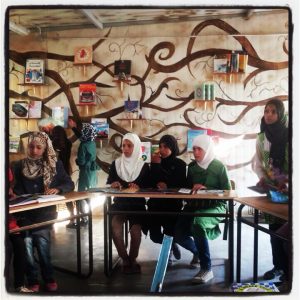
The girl children in the library reading the books which Jackie Jenkins bought.
We talk about it a lot as educators and parents. A few weeks ago I saw what it really means: to dig deep and push on with a smile on your face and a belief in a better tomorrow, even when faced with war on your doorstep and trauma in your past.
I had been waiting to go to the Zataari refugee camp with Rob (my husband and Representative for UNICEF Jordan) since we arrived in Jordan. The day finally arrived.
We viewed the water sanitation facilities and delivery trucks, which was fascinating. As an educator, however, I was most excited to see some of the schools. I was in my element the minute we walked through the gates. While Rob went to check on the status of classroom desks, play space construction, and water in the latrines, I wanted to see some kids.
I met two incredible principals of the girls’ section of school (girls attend school in the morning, boys in the afternoon). They told me that the Ministry of Education has done an excellent job at getting them all the teaching materials they need and that the school was in good condition. But class sizes are a problem. . . and so we began to walk. . . .
Grade 2 has more than 100 students in a classroom. Girls sit three to a bench, with the overflow sitting on the floor. When I walked in, they burst into a song, which I am sure I was meant to stand and smile at. But I can’t help myself around small people, so I just started dancing all over the place, up the aisles and in the front. The girls laughed and laughed. Kids are the same everywhere! But these children deserve a whole lot more after what they have been through.
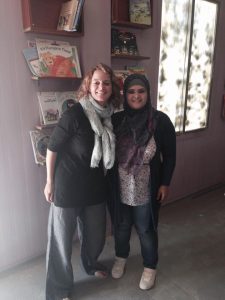
World Mom, Jackie Jenkins, with Iman Alkhaldi, the Librarian.
Luckily, there are people in their lives like Iman, whom I also met that day. She single-handedly built a library in one of the containers that serve as school rooms. She painted it, collected wood to build shelves, and is now looking for books. She spoke good enough English for me to understand her dreams and passion, and for me to tell her, “It is women like you who will change the world. You already are.” She cried, and I cried, and I also promised I would fill that room with books written in Arabic and English.
So I left with a new mission. If Iman can build a library oasis, if the dedicated teachers can manage to educate 100 students in a classroom without a complaint after walking out of their country affected by war, I could certainly help fill that library.
Within hours of being home, we set up a crowdrise page for donations. I sent out emails to international schools globally telling them the story of Iman and the children I had met. My 14 year old daughter talked it up on her social media networks, and I went to bed that night feeling a fire in my belly that I had not felt since my arrival. A deep passion to make a small difference in an immediate way. It seems the story resonated with many. In just 48 hours, I had reached my target goal, and was able to purchase more than 500 English and Arabic books, which were delivered to the library within the week.
Grit plus humanity–the connection and compassion with those around us–can accomplish astounding results. Yet again, I am filled with a sense of hope for the future of a region plagued by conflict and stress.
How do you help our children grow up with grit and the perseverance to face the challenges inevitable in their future? What is one concrete thing you might be able to do in your home or life that is a change for good?

We are a few months into our new 'home of our heart' location in Amman, Jordan. Originally from Canada, I have been moving around the globe for more than twenty years as my husband works for UNICEF. While we were a carefree couple in Uganda, Lesotho and Bangladesh, Meghan joined our family in 2000, while we were living in Myanmar. She was joined in 2005, while we were posted in India by Charlie, her energetic younger brother! Since then we have lived in Mozambique and New York. I am an educator and have been incredibly fortunate to have found rewarding jobs in international schools wherever we have been posted. Most recently I was the Elementary School Principal at the United Nations International School in Manhattan. Since arriving in Jordan, I have been a stay at home Mum, exploring, photographing and learning about the incredible history of the region and the issues facing not only the Jordan population but the incredible number of Syrian refugees currently residing in the country. While I speak English and French, I have not yet started to learn Arabic; a big goal for our time here.
I write to record and process this incredible journey we are on as a family. Time passes so incredibly quickly and without a recording of events, it's hard to remember the small moments and wonderings from each posting. Being a mother in this transient lifestyle means being the key cheerleader for our family, it means setting up and taking down a house with six weeks notice, it means creating close friendships and then saying goodbye. All this, while telling yourself that the opportunities your children have make the goodbyes and new hellos worthwhile. Raising a child in this lifestyle has incredible challenges and rewards. The challenges include culture shock every single time, even when you feel the move will be an easy one. It means coaching yourself, in your dark moments to be present and supportive to your children, who have not chosen to move but are trusting you to show them the world and the meaningfulness of the lifestyle we have committed to as a UNICEF family. The upsides to this lifestyle are incredible; the ability to have our children interact and learn about cultures, languages, food, and religions firsthand, the development of tolerance and empathy through relationships with many types of different people and the travel, they have been to more places before the age of ten than some people do in a lifetime! My commitment to raising children who believe in peace and feel responsible for making a difference in creating a better world is at the core of everything I do.
More Posts
Follow Me:

by Nihad | Jan 7, 2015 | 2014, Awareness, Education, Egypt, Family, Life, Relationships, Womanhood, Women's Rights, World Moms Blog, World Motherhood
 Happy New Year! In this season of resolutions, many of us are looking for ways to live a happier life. As a mother, I believe increasing one’s happiness is a wonderful thing to do for oneself and for one’s family–an angry, bitter and unhappy woman can never make her family happy. But how do we find our way to a happier life?
Happy New Year! In this season of resolutions, many of us are looking for ways to live a happier life. As a mother, I believe increasing one’s happiness is a wonderful thing to do for oneself and for one’s family–an angry, bitter and unhappy woman can never make her family happy. But how do we find our way to a happier life?
Happiness is all about us, about our mindset, what we believe and how we feel. Our circumstances, our possessions, our job and our bank account are just temporary sources of happiness. Real happiness shines from the inside out, reflecting how we feel about ourselves and how satisfied we are with who we are and how we live. As a life coach, here are 10 practices I’ve found that enhance my daily happiness.
1- Improve your self image: For me, the first and most important source of happiness is how I feel about the image I see in the mirror. How proud do I feel about myself? What kind of relationship do I have with myself? Do I offer myself love, respect, acceptance and appreciation? Or is it guilt, shame, anger, and low self esteem? Being happy with who I am is my main source of happiness.
2- Don’t seek approval of others: Many women live in a way they don’t want just to please their partner, their family, or their friends. Though this may result in short-term approval and acceptance, living according to others’ expectations will not create lasting happiness.
3- Keep your word to yourself: Learn to say NO to what is not a priority in your life. If you set a ME time for yourself ,do not give it up easily. Keeping your word to yourself will greatly enhance your feeling of self worth and self respect.
4- Eat healthy food and exercise: Healthy food will positively impact your mood and give you more energy. Working out regularly has a great effect on physical and mental health. According to a psychiatrist friend of mine, walking one hour in open air equates the effect of an antidepressant pill. So when you feel down, try going for a walk outside.
5- Let go: Let’s face it. There are some aspects of our lives we cannot control. We certainly can’t control, or change, the past. Accepting the reality that we can do nothing brings a great relief and freedom.
6- Find your passion: Working on something you love brings real satisfaction. If you haven’t yet found your passion, play around with different hobbies like making or listening to music, drawing, or writing. Expressing your thoughts and feelings in any way will help you get clear about what your passion is.
7- Keep only fulfilling relationships: Continuing with unhealthy and non-fulfilling relationships is an energy drain. See no. 3.
8- Keep a gratitude journal: Make it a habit to jot down 5 things in your life for which you are grateful. If have something you complain about all the time, follow your complaint with any positive you can find in it. Eventually, you may find a blessing in what you were complaining about.
9- LOL: Find a reason every day to laugh, and spend time with your beloved ones having fun and laughing out loud.
10- Spend some time away from media and technology: Take a brief holiday from the TV, radio, internet, even your iPhone. Spend the time working out, meeting friends, reading books, playing with your kids and pets, or taking a walk. Observe how you feel. Just few days (or even an afternoon) without media and technology will make great difference in your life and your satisfaction.
These are my tips on how to live a happier life. What are some things you do to add happiness to your life? What is your definition of happiness and do you find it easy to live according to this definition? What challenges do you face to live a happier life?
This is an original post for World Moms Blog by Nihad from Alexandria, Egypt. Nihad blogs at Aurora Beams Life Coaching.
Image courtesy of “Pretty Girl In A Hat At Sunset” by Stuart Miles, FreeDigitalPhotos.net

Nihad is an Egyptian woman, who was born and has lived her whole life in Alexandria, Egypt. She says, “People who visited this city know how charming and beautiful this city is. Although I love every city in Egypt, Alexandria is the one I love the most.”
She is a software engineer and has worked in the field for more than twenty years. But recently she quit her job, got a coaching certificate and she is now a self employed life and career coach. She says, “I believe that women in this era face big challenges and they are taking huge responsibilities. That's why I have chosen my niche -- women looking for happiness and satisfaction. I help and support them in making whatever change (career change, life change, behavior change, belief change…) they want to bring more satisfaction and happiness in their lives.”
Nihad is a mother of two lovely boys, 15 and 9 years old. She states, “They are the most precious gifts I have ever had. I madly love them, and I consider them the main source of happiness in my life.”
Our inspiring mother in Egypt can also be found at Aurora Beams Life Coaching.
More Posts

by Susie Newday (Israel) | Dec 21, 2014 | 2014, Childhood, Friendship, Israel, Life, Moving, Susie Newday
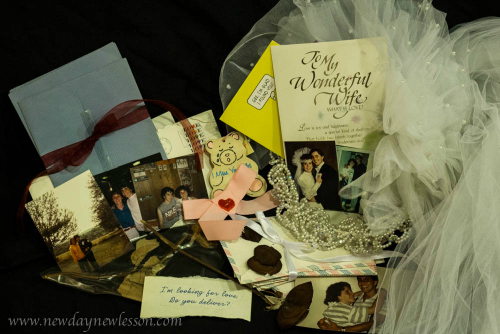
They sit there.
A mixed pile of emotions, long lost puzzle pieces of my youth that have surfaced with a surreal reminder of joy and heartache. A collection of recollections of the beauty and naivete of my tormented, confused yet vibrant teen years.
Pieces of papers and assorted mementos, all too precious for me to have thrown away, yet not important enough for me to taken them when I started my married life and moved away.
Yet here they are. Twenty-five years later they have made the journey overseas and have arrived in my home. When my parents cleaned out my childhood home before moving away, I once again couldn’t bear for these pieces of my youth to be thrown out without a second glance. Who knows what treasures might be hidden in their midst.
Now I’m overwhelmed. By the amount and variety of written correspondence I saved. There are letters from my first love at the age of 14, so beautiful, sincere and full of promise. There are tender letters from my husband back in the years before email and text messages. There are stacks of heartfelt letters from people whom I don’t remember, people I’m sure I thought I would never forget. There are letters from people whom I remember but am surprised to find out how close I used to be with them. There are blasts from the past like my old college roommate who by chance recently friended me on Facebook. There are cards and yearbooks full of short wishes and goodbyes.
Some comments make my heart go thump, while others like “ Don’t beat up too many boys.”, remind me of parts of my personality that I wish I could forget. There are words of friendship, caring, support and encouragement that warm the cockles of my heart. And I wonder yet again why certain people stayed in my life and others drifted away.
That’s the hard part of nostalgia, trying to make sense of things, trying to understand how you gently got rerouted to a path so wonderful yet so different than the one you had envisioned.
The empty seductive promises of the past are dangerous, for they’re not real in the present moment in time. They were real in a different reality when you were a different person. Yet even so, it’s hard to read your youth without wondering about alternate endings to your life story. The past is an enticing illusion, a strong magnet drawing you in and distorting the present.
Do you think there is any way to embrace the joy and wonder of what was without leaving both the past and the present a little less whole?
Susie Newday is a happily-married American-born Israeli mother of five. She is an oncology nurse, blogger and avid amateur photographer.
Most importantly, Susie is a happily married mother of five amazing kids from age 8-24 and soon to be a mother in law. (Which also makes her a chef, maid, tutor, chauffeur, launderer...) Susie's blog, New Day, New Lesson, is her attempt to help others and herself view the lessons life hands all of us in a positive light. She will also be the first to admit that blogging is great free therapy as well. Susie's hope for the world? Increasing kindness, tolerance and love.
You can also follow her Facebook page New Day, New Lesson where she posts her unique photos with quotes as well as gift ideas.
More Posts - Website
Follow Me:






by Mannahattamamma (UAE) | Dec 10, 2014 | Expat Life, Feminism, Gun Violence, News, Prejudice, Social Media, Tragedy, UAE, USA
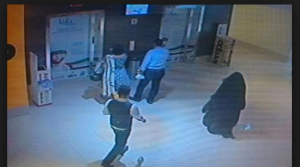 “Are you okay?” The emails and Facebook queries began pouring in even before I knew what had happened. “Were you there?” One particularly dramatic friend asked if “what happened” made me think about moving home.
“Are you okay?” The emails and Facebook queries began pouring in even before I knew what had happened. “Were you there?” One particularly dramatic friend asked if “what happened” made me think about moving home.
Their queries followed the terrible news that had gone viral almost as soon as it happened: in a mall bathroom in Abu Dhabi, where I live, a veiled woman had killed a Western woman—-an American teacher-—with a long kitchen knife. Adding to the horror of the attack was the fact that the victim’s children, eleven-year old twins, were apparently hanging out in the mall waiting for their mother to come back from the bathroom.
I didn’t hear the news until I got home from work that day and opened Facebook. I suppose that people were particularly worried because I am also an American teacher, and about a month ago, the US Embassy in Abu Dhabi reported that anonymous threats against American teachers had been made on a jihadi website. For a day or two after the attack, news reports tossed around the possibility that the veiled woman was somehow in league with ISIL, or some other terrorist organization.
As it happens, however, the murderer had no discernible terrorist allegiances, and what happened in that mall bathroom was just an appalling act of violence. Some of us who live here speculated about the difference between what happens in the US when an unstable person finds a weapon and what happened here:
a butcher knife is a brutal instrument, it’s true, but it creates far less mayhem than, say, a semi-automatic rifle.
According to a 2007 survey, the US ranks first in the list of number of guns owned by civilians (90 guns per 100 residents); the UAE ranks 24th (22 guns per 100).
Violent crime is incredibly rare in Abu Dhabi. Yet, despite the rarity of violence here, and despite the stability of the Gulf States, there was the chatter on Facebook; there were the emails; there were the questions about whether this attack would cause me to move home. “Home” is a bit complicated for me: I’ve lived in Abu Dhabi for almost four years, but had been in Manhattan for almost twenty years before that. So “home” is here. . . and there.
Before we moved to Abu Dhabi, my family and friends were worried about other things. “Are you going to have to, you know,” they’d ask, swirling their hands around their head as if describing the world’s biggest beehive hairdo. Their swirl implied “covering”: would I have to wear a headscarf or an abaya when I went out in public? The answer is no. I feel free to walk around alone wherever I please, dressed much the same way I would be in New York. There are no laws governing how people dress here; women are free to cover or not cover, and on the beaches you see burqas and bikinis with equal frequency.
In fact, I feel as safe walking alone in Abu Dhabi as I ever did in New York. It’s the kind of place where I leave the car doors unlocked when I run into the grocery store, and where more than once I’ve forgotten my phone in some public place, only to run back ten minutes later to find it exactly where I left it.
I share the sentiments of my local friend, Ken. In response to the news, he posted the following message on his Facebook page: “Thank you for your e-mails and messages about the American woman who was killed here on December 1st. I appreciate your concern. But please be assured that I don’t feel in any greater danger being a Westerner in Abu Dhabi than I felt being a gay man in New York City. In fact, it’s the opposite. I’m used to danger.
The only way to protect oneself completely from acts of terror or random violence is by not participating in the world. I won’t do that.”
The expressions of worry that came from my family and friends in the aftermath of this attack were real, I know. And there is no doubt that what happened is appalling and has ripped apart the lives of this woman’s family. But I can’t help but suspect that this story got as much coverage as it did (there are more than thirteen pages of hits for “American teacher slain Abu Dhabi) because the attacker is so visibly Other: a veiled woman, an exotic symbol of “the Middle East,” which to much of the West is still an undifferentiated blur of veils, oil rigs, and jihadis.
Here’s the teaser from CNBC when the story about the knife attack first broke:
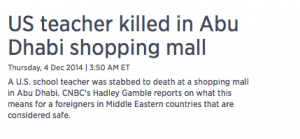
I wonder about the leap: that an attack in a mall bathroom by a woman with a knife might have implications for “foreigners” living anywhere in the Middle East.
It’s a strange twist, isn’t it, to think that had the Western media simply assumed that the attack was an isolated, horrifying incident—the work of one crazy woman—it might have represented a step forward?
This is an original post written for World Moms Blog by Deborah Quinn.
Photo Credit: Daily Mail
After twenty-plus years in Manhattan, Deborah Quinn and her family moved to Abu Dhabi (in the United Arab Emirates), where she spends a great deal of time driving her sons back and forth to soccer practice. She writes about travel, politics, feminism, education, and the absurdities of living in a place where temperatures regularly go above 110F.
Deborah can also be found on her blog, Mannahattamamma.
More Posts
Follow Me:


 Outside Amman, the capital city of my new home, life continues to unfold much as it has for centuries. Or so it seems at first glance.
Outside Amman, the capital city of my new home, life continues to unfold much as it has for centuries. Or so it seems at first glance.



















